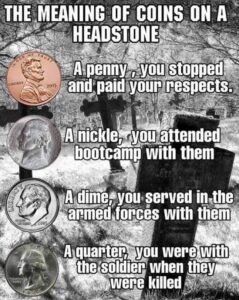The Meaning Behind Leaving a Coin on a Grave
If you’ve ever wandered through a cemetery, you might have spotted coins left on gravestones. It’s a small act that can leave you wondering what it means. While simple in appearance, this practice carries deep meaning for many and has been part of various cultural and historical traditions for centuries.
The Historical Roots of Leaving Coins
The practice of leaving coins with the dead dates back to ancient times. Many ancient civilizations had unique customs involving coins and the deceased, often linked to beliefs about the afterlife.
– In Ancient Greece, people placed coins in the mouths or on the bodies of their loved ones to pay for safe passage across the River Styx. This mythical river was said to separate the world of the living from the underworld, and the ferryman, Charon, required payment for transport.
– In Roman culture, similar customs existed. Romans often placed coins over the eyes or in the mouths of their deceased, symbolizing payment for a final journey into the afterlife.
While modern practices may no longer directly follow these ancient customs, the symbolism of leaving coins with the dead still echoes through history.
A Tradition of Military Honor
 In the United States, coins left on the graves of military personnel have a specific, deeper significance. The gesture shows respect and recognition, with the type of coin left conveying different messages.
In the United States, coins left on the graves of military personnel have a specific, deeper significance. The gesture shows respect and recognition, with the type of coin left conveying different messages.
– A Penny signifies that someone visited the grave as a simple sign of respect.
– A Nickel means the visitor trained at boot camp with the deceased.
– A Dime indicates that the person served alongside the deceased at some point.
– A Quarter is the most significant, symbolizing that the visitor was present when the person passed away, creating a deeper bond of shared experience.
These coins, especially in military cemeteries, not only pay tribute to fallen soldiers but also help connect visitors to the person buried, showing that they’re remembered by those who served with them or cared for them.
A Symbol of Connection
Even outside of military settings, leaving coins on a grave has become a way to maintain a sense of connection with the departed. For many, it’s a way to show that the deceased isn’t forgotten, and the act itself is a quiet, personal gesture that says, “I still remember you.”
– A Mark of Respect: Sometimes, leaving a coin is simply a way to show respect for the person buried. It might indicate that someone visited the grave and is paying their respects.
– A Personal Meaning: For some, it’s about more than just tradition. A coin may hold personal significance between the visitor and the deceased, or it could be left as a form of farewell, gratitude, or even apology.
In some cultures, leaving a coin or another small token—like a flower or stone—can represent a prayer, an offering, or a sign that the deceased remains in the thoughts of the living.
Cultural and Personal Differences
The meaning of leaving coins on graves varies across cultures and individuals. For instance, in Jewish cemeteries, it’s common to leave small stones instead of coins. Stones are believed to symbolize permanence and lasting memory, indicating that someone visited and that the person’s legacy endures.
For others, the act might be entirely personal, unrelated to any particular custom. It could be something that feels right at the moment, a way of continuing a personal connection with the deceased.
Should You Leave a Coin?
If you ever feel moved to leave a coin when visiting a grave, it’s a simple yet meaningful way to show someone you still remember them. Whether to honor a soldier, a family member, or even a stranger, leaving a coin can serve as a sign of respect, memory, or reflection.
At its heart, this gesture is a quiet acknowledgment that the person who passed away still holds a place in the thoughts of those who visit. And that’s the ultimate message: they are not forgotten.
Final Thoughts
Leaving a coin on a grave might seem like a small, unassuming act, but its meaning is rich. It spans across history, from ancient beliefs about the afterlife to modern customs of honoring soldiers and loved ones. Whether you’re following tradition or creating your own personal gesture, placing a coin on a gravestone is a way to show respect, maintain a connection, and ensure that the memory of the deceased endures.
The next time you visit a grave, consider leaving a coin. It’s a simple act that carries a world of meaning.

Sadly, in today’s society, it’s likely that someone will steal the coins off the top of the headstone.
In my parents’ cemetery, the coins would immediately be stolen. There’s no respect here.
Ella,
That’s truly sad, but in today’s world, it’s also no surprising.